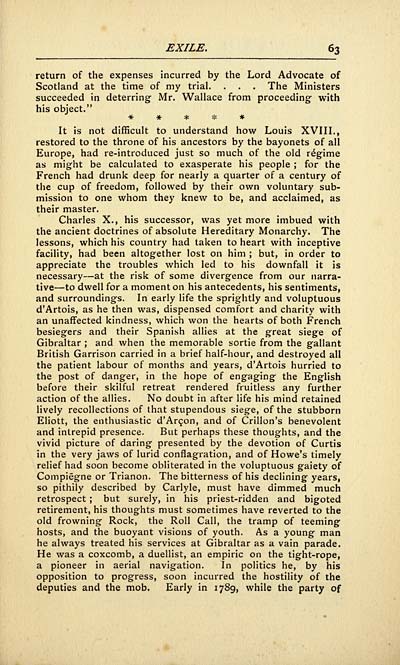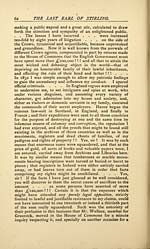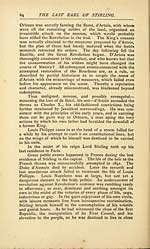Life of the last Earl of Stirling
(73) Page 63
Download files
Complete book:
Individual page:
Thumbnail gallery: Grid view | List view

EXILE. 63
return of the expenses incurred by the Lord Advocate of
Scotland at the time of my trial. . . . The Ministers
succeeded in deterring Mr. Wallace from proceeding - with
his object."
It is not difficult to understand how Louis XVIII.,
restored to the throne of his ancestors by the bayonets of all
Europe, had re-introduced just so much of the old regime
as might be calculated to exasperate his people ; for the
French had drunk deep for nearly a quarter of a century of
the cup of freedom, followed by their own voluntary sub-
mission to one whom they knew to be, and acclaimed, as
their master.
Charles X., his successor, was yet more imbued with
the ancient doctrines of absolute Hereditary Monarchy. The
lessons, which his country had taken to heart with inceptive
facility, had been altogether lost on him ; but, in order to
appreciate the troubles which led to his downfall it is
necessary — at the risk of some divergence from our narra-
tive — to dwell for a moment on his antecedents, his sentiments,
and surroundings. In early life the sprightly and voluptuous
d'Artois, as he then was, dispensed comfort and charity with
an unaffected kindness, which won the hearts of both French
besiegers and their Spanish allies at the great siege of
Gibraltar ; and when the memorable sortie from the gallant
British Garrison carried in a brief half-hour, and destroyed all
the patient labour of months and years, d'Artois hurried to
the post of danger, in the hope of engaging the English
before their skilful retreat rendered fruitless any further
action of the allies. No doubt in after life his mind retained
lively recollections of that stupendous siege, of the stubborn
Eliott, the enthusiastic d'Arcon, and of Crillon's benevolent
and intrepid presence. But perhaps these thoughts, and the
vivid picture of daring presented by the devotion of Curtis
in the very jaws of lurid conflagration, and of Howe's timely
relief had soon become obliterated in the voluptuous gaiety of
Compiegne or Trianon. The bitterness of his declining years,
so pithily described by Carlyle, must have dimmed much
retrospect ; but surely, in his priest-ridden and bigoted
retirement, his thoughts must sometimes have reverted to the
old frowning Rock, the Roll Call, the tramp of teeming
hosts, and the buoyant visions of youth. As a young man
he always treated his services at Gibraltar as a vain parade.
He was a coxcomb, a duellist, an empiric on the tight-rope,
a pioneer in aerial navigation. In politics he, by his
opposition to progress, soon incurred the hostility of the
deputies and the mob. Early in 1789, while the party of
return of the expenses incurred by the Lord Advocate of
Scotland at the time of my trial. . . . The Ministers
succeeded in deterring Mr. Wallace from proceeding - with
his object."
It is not difficult to understand how Louis XVIII.,
restored to the throne of his ancestors by the bayonets of all
Europe, had re-introduced just so much of the old regime
as might be calculated to exasperate his people ; for the
French had drunk deep for nearly a quarter of a century of
the cup of freedom, followed by their own voluntary sub-
mission to one whom they knew to be, and acclaimed, as
their master.
Charles X., his successor, was yet more imbued with
the ancient doctrines of absolute Hereditary Monarchy. The
lessons, which his country had taken to heart with inceptive
facility, had been altogether lost on him ; but, in order to
appreciate the troubles which led to his downfall it is
necessary — at the risk of some divergence from our narra-
tive — to dwell for a moment on his antecedents, his sentiments,
and surroundings. In early life the sprightly and voluptuous
d'Artois, as he then was, dispensed comfort and charity with
an unaffected kindness, which won the hearts of both French
besiegers and their Spanish allies at the great siege of
Gibraltar ; and when the memorable sortie from the gallant
British Garrison carried in a brief half-hour, and destroyed all
the patient labour of months and years, d'Artois hurried to
the post of danger, in the hope of engaging the English
before their skilful retreat rendered fruitless any further
action of the allies. No doubt in after life his mind retained
lively recollections of that stupendous siege, of the stubborn
Eliott, the enthusiastic d'Arcon, and of Crillon's benevolent
and intrepid presence. But perhaps these thoughts, and the
vivid picture of daring presented by the devotion of Curtis
in the very jaws of lurid conflagration, and of Howe's timely
relief had soon become obliterated in the voluptuous gaiety of
Compiegne or Trianon. The bitterness of his declining years,
so pithily described by Carlyle, must have dimmed much
retrospect ; but surely, in his priest-ridden and bigoted
retirement, his thoughts must sometimes have reverted to the
old frowning Rock, the Roll Call, the tramp of teeming
hosts, and the buoyant visions of youth. As a young man
he always treated his services at Gibraltar as a vain parade.
He was a coxcomb, a duellist, an empiric on the tight-rope,
a pioneer in aerial navigation. In politics he, by his
opposition to progress, soon incurred the hostility of the
deputies and the mob. Early in 1789, while the party of
Set display mode to:
![]() Universal Viewer |
Universal Viewer | ![]() Mirador |
Large image | Transcription
Mirador |
Large image | Transcription
Images and transcriptions on this page, including medium image downloads, may be used under the Creative Commons Attribution 4.0 International Licence unless otherwise stated. ![]()
| Histories of Scottish families > Life of the last Earl of Stirling > (73) Page 63 |
|---|
| Permanent URL | https://digital.nls.uk/95601317 |
|---|
| Description | A selection of almost 400 printed items relating to the history of Scottish families, mostly dating from the 19th and early 20th centuries. Includes memoirs, genealogies and clan histories, with a few produced by emigrant families. The earliest family history goes back to AD 916. |
|---|

